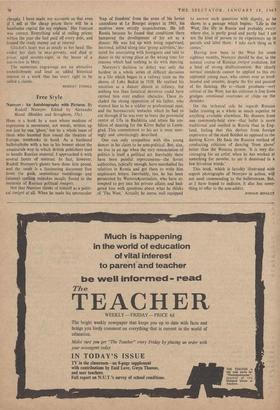Free Style Nureyev : An Autobiography with Pictures. By Rudolf
Nureyev. Edited by Alexander Bland. (Hodder and Stoughton, 35s.) HERE is a book by a man whose medium of expression is movement, not words, written up not just by one 'ghost,' but by a whole team of them who haunted him round the theatres of Europe, notebooks in hand. As a hardened balletophobe with a bee in his bonnet about the amateurish way in which British publishers tend to handle Russian material. 1 approached it with several layers of mistrust. In fact, however, Rudolf Nureyev's ghosts have done him proud, and the result is a fascinating document free from fle gush, sententious moralisings and (almost) spelling mistakes usually found in the memoirs of Russian political emigres.
Not that Nureyev thinks of himself as a politi- cal emigre at all. When he made his spectacular 'leap of freedom' from the arms of his Soviet custodians at Le Bourget airport in 1961, his motives were strictly terpsichorean. He left Russia because he found that conditions there hampered the development of his art as a dancer. He was fed up with being supervised, hectored, jollied along into 'group activities,' lec- tured for associating with foreigners and told to dance in the wrong place at the wrong time for reasons which had nothing to do with dancing.
Nureyev's decision to defect was only the hardest in a whole series of difficult decisions in a life which began in a railway train on the shores of Lake Baikal in 1938. He realised his vocation as a dancer almost in infancy, but nothing less than fanatical devotion could have carried him over endless obstacles. These in- cluded the strong opposition of his father, who wanted him to be a soldier or professional man, and the bureaucratic tentacles which he bad to cut through if he was ever to leave the provincial centre of Ufa in Bashkiria and attain his am- bition of dancing for the Kirov Ballet in Lenin- grad. This commitment to his art is most mov- ingly and convincingly described,
One can only sympathise with this young dancer in his claim to be non-political. But, alas, we live in an age when the very renunciation of politics is itself a political act. Inevitably there have been painful repercussions—the Soviet authorities, typically enough, have marshalled his relatives in Russia and got them to write him unpleasant letters. Inevitably, too, he has been persecuted by WesternvOurnalists, who have at- tempted to pry into his private affairs and bad- gered him with questions about what he thinks of 'The West.' Actually he seems well equipped to answer such questions with dignity, as he shows in a passage which begins: 'Life in the West, like life in Russia and probably every- where else, is partly good and partly bad. I am not the kind of person to tie experiences up in parcels and label them: I take each thing as it comes.'
Having now been in the West for some eighteen months, Nureyev should be due, in the
normal course of Russian emigre evolution, for
a bout of strong disillusionment. But clearly normal standards cannot be applied to this ex- ceptional young man, who comes over as level-
headed and sensible, despite the fire and passion of his dancing. He is—thank goodness—very
critical of the West, but his criticism is free from grudges, emotional overtones or chips on the shoulder.
On the technical side he regards Russian ballet training as a whole as much superior to anything available elsewhere. He dissents from one commonly-held view—that ballet is more traditional and ossified in Russia than in Eng-
land, feeling that this derives from foreign experience of the staid Bolshoi as opposed to the dashing Kirov. He finds the Russian method of conducting criticism of dancing 'from above' better than the Western system. 'It is very dis- couraging for an artist, when he has worked at something for months, to see it dismissed in a few frivolous words.'
This book, which is lavishly illustrated with superb photographs of Nureyev in action, will not need commending to the balletomane. But, as I have hoped to indicate, it also has some- thing td offer to the non-addict.
RONALD HINGLEY






























 Previous page
Previous page